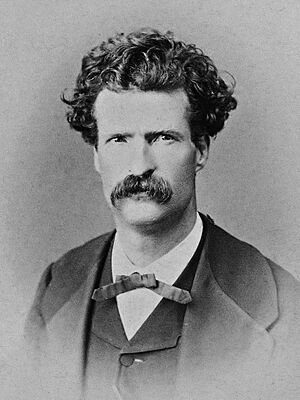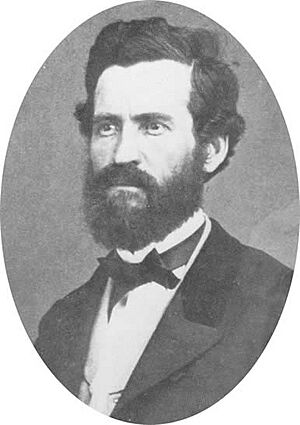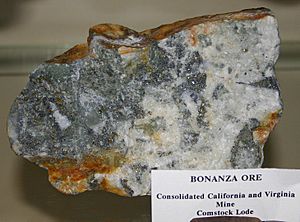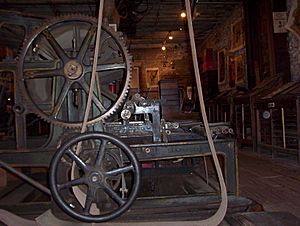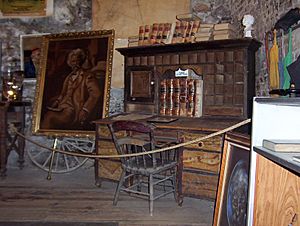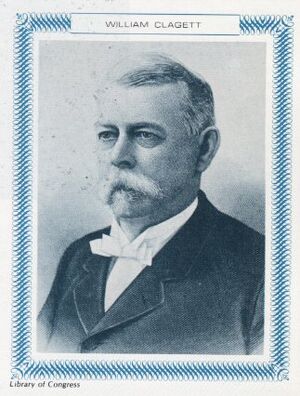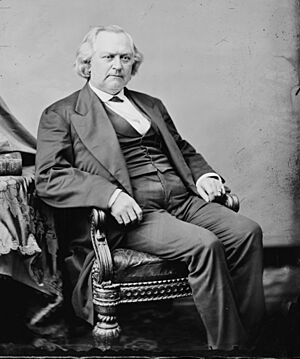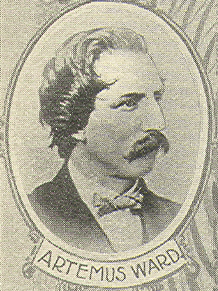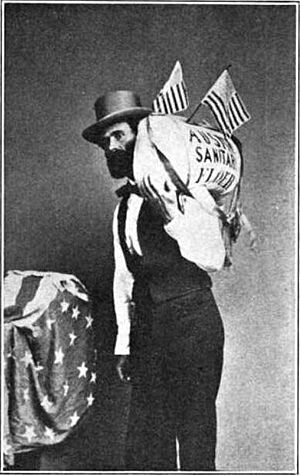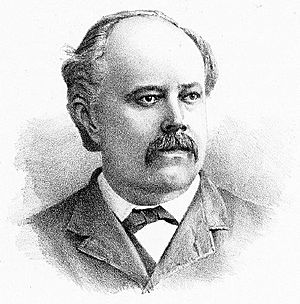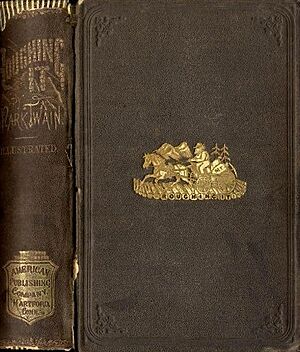Mark Twain in Nevada facts for kids
Did you know that the famous writer Samuel Clemens first started using his pen name, Mark Twain, while he was living in Nevada? He lived there from 1861 to 1864. This time was very important for him. He met other writers and humorists who helped shape his unique writing style.
Contents
Starting Fresh in Nevada
Samuel Clemens wanted a new start. He had left a small group of Confederate soldiers because he didn't like military life. So, when his brother offered him a chance to go to Nevada, he took it!
Samuel's brother, Orion Clemens, was against slavery. He had supported Abraham Lincoln for president. Lincoln later appointed Orion as the secretary of the Nevada Territory in 1861. Orion didn't have money to travel, so Samuel paid for their trip. They left Missouri in July 1861 by stagecoach. The journey took 19 days and cost $150 per ticket, which was a lot of money back then! Samuel paid with money he saved from being a riverboat pilot.
Samuel was supposed to be Orion's private secretary. But he quickly found the job boring. There wasn't enough writing to keep him busy. He also didn't like working under his brother's authority.
Changing Views on the Civil War
Before the American Civil War, Samuel Clemens had supported ideas that allowed both the Union and slavery. He even thought states should be able to leave the country if they felt wronged.
When he arrived in Nevada, it was a place where many people supported the Union. But there was also a strong group who supported the Southern states. Virginia City, where Samuel lived, was even named by Southerners.
As the war went on and the Union started winning, public opinion in Nevada changed. Samuel Clemens also began to change his mind. He started to support the Union.
Trying His Luck in Mining
Samuel Clemens soon got tired of working for his brother. He decided to try his luck in the silver mines of Nevada. He dreamed of becoming rich by finding silver. He partnered with a few people, including Calvin Higbie, to search for valuable ore.
However, Samuel's mining efforts were not very successful. Many people had already rushed to the area to find silver since 1859. By the time he started, it was hard for amateur miners to strike it rich. The value of mining shares was also falling. It seemed only lawyers who handled mining disputes were getting rich!
In his book Roughing It, Samuel Clemens wrote funny stories about his time in Nevada. He told a story about finding a huge vein of silver with his partner. But they got distracted and lost their claim. Others then took over and became rich. Historians say he made this story much bigger for comic effect, but he did lose a promising claim.
Since he couldn't find enough silver to support himself, Samuel took a job shoveling mining waste for low wages. He was not happy with this work.
Becoming a Newspaper Reporter
In 1862, Samuel Clemens started sending letters to the main newspaper in Nevada, the Territorial Enterprise in Virginia City. By the fall, he was offered a job as the city editor for $25 a week. This was more than he expected, and he worried he wasn't experienced enough. But he had been supporting himself since he was 13, so he took the job despite his worries.
The Territorial Enterprise was run by Joseph T. Goodman, who became Samuel's mentor. Goodman and his staff liked Samuel's letters, especially one that made fun of a local judge. Samuel began writing about local news, mines, ghost stories, and social events. He even made up some stories!
One of his most popular stories in 1862 was about a "Petrified Man." He claimed a petrified man had been found near Gravelly Ford. This was a hoax, meant to make fun of a local politician and people who believed strange stories too easily. The funny story quickly spread to other newspapers.
On February 3, 1863, Samuel Clemens signed a letter to the Territorial Enterprise with "yours dreamily, MARK TWAIN." This was the first time he used the name that would make him famous! He later visited San Francisco, where he made important connections with other writers.
His Views Keep Changing
When Samuel Clemens first came to Virginia City, he boasted that he had been a first lieutenant in the Confederate Army. It was later found out he was only a second lieutenant in a small group of Missouri farm boys. This boast upset people on both sides. Even the governor, James W. Nye, called him a "damned secessionist."
Samuel's brother, Orion, was a strong supporter of the Union. Samuel's behavior became an embarrassment to him. But Samuel's attitude began to change in 1862 as the Union armies started winning more battles. He slowly gave up his Confederate sympathies. By September 1862, he was calling Union soldiers "we" in his letters.
In July 1863, a Union flag on Mt. Davidson survived a strong electrical storm. Mark Twain, now writing under his pen name, said its survival was a sign of Union victory. With this, he publicly showed his full support for the Union.
The Third House: A Funny Government
Mark Twain's humor became very popular. He joined a group called "the Third House." This was a funny group of reporters, lawyers, and business people who made fun of the real government. They met after the actual legislature finished its work. Even elected lawmakers would join in the fun!
The name "Third House" made fun of the two houses of the real government. It also referred to journalism as "the Fourth Estate," which checks on governments. The Third House meetings were all about humor. They were like a fake legislature where politicians and their way of speaking were the targets of jokes. Twain would even make fun of politicians he respected, and his jokes would then appear in the Enterprise newspaper.
In December 1863, the members of the Third House chose Twain as their "President of the Convention." This was a joke about the real convention trying to write a state constitution for Nevada. Twain even made fun of important people like William Morris Stewart, who later became a U.S. senator.
Meeting Artemus Ward
Twain met many famous people who visited Virginia City. But one of the most important was Artemus Ward, a famous humorist. Ward visited Virginia City in December 1863 and stayed for three weeks.
Twain and Ward quickly became friends. Ward gave Twain advice about his career. He told Twain to aim higher than just being a Western journalist. He even promised to talk to editors in New York about Twain's writing. Ward encouraged Twain to move to New York. Twain didn't go with Ward then, but Ward's help led to Twain publishing two stories in a New York newspaper in 1864. Later, in 1865, Twain sent his famous story The Celebrated Jumping Frog of Calaveras County to New York, and it became a national success!
Even though Ward died young in 1867, his style and humor greatly influenced Mark Twain's writing.
Gaining Political Influence
In 1864, Twain started covering another legislative session. Because of his family's political connections, his reports, even though they were still funny, made him seem like an important person in public affairs. His jokes and social comments were about important community issues. As his audience and influence grew, politicians wanted to stay on his good side so they wouldn't be made fun of in the Enterprise.
Twain tried to use his influence to help move Nevada's capital from Carson City to Virginia City, which his boss also wanted. Both sides fought hard. Twain's newspaper articles even accused people of corruption. He would change his opinions on issues to support his goal. For example, he first said money for a private school was well spent, then called it a "private affair" and hinted at fraud, and later called it a "worthy measure" again! The capital stayed in Carson City, but his changing views on the school would cause him trouble later.
A Sad Loss
On January 29, 1864, Twain's niece, Jennie, became very ill with spotted fever. Twain was very close to her. He had recently visited her school and written an article about it. He later used memories from this visit in his book The Adventures of Tom Sawyer. Twain, his sister-in-law, and his brother stayed by Jennie's side, praying. On February 1, 1864, she died. Twain was heartbroken and remained sad about it for the rest of his life.
The Sanitary Affair: Fundraising and Trouble
Nevada was still a territory during the Civil War. Twain's newspaper writing covered a political scene that was very tense. His satirical writing was sometimes seen as disloyal to the Union.
In mid-1864, Twain got involved in a serious argument with the editor of a rival newspaper. This happened while both were involved in fundraising for "sanitary commissions." These groups raised money to care for wounded Union soldiers. The money was sent to a big fair in St. Louis. Twain wrote articles encouraging people to donate.
The Great Austin Flour Sack
One fundraising campaign was led by Twain's friend Reuel Colt Gridley, a grocer. Gridley carried a sack of flour from town to town. People would "bid" on the sack, donating money to "buy" it. But no one actually took the sack. They just wanted to show off their town's pride and outbid their rivals! Gridley kept the sack and took it to the next town.
The flour sack started as a bet between Gridley and another man over a mayoral election. Gridley lost and had to carry the sack through town with a band playing "John Brown's Body." The winner didn't want the flour, so they decided to auction it for the sanitary commission. People kept bidding, but then refusing to take the sack, so it was auctioned again and again. Other towns heard about it and invited Gridley to bring the sack to them.
On May 15, Gridley brought the sack to Virginia City. Twain went with other reporters to cover the event. He wrote two long articles for the Enterprise about the sack's journey. The sack traveled to other towns and then came back to Virginia City. The people of Virginia City were eager to outbid the smaller towns.
Newspaper Rivalry and a Challenge
On May 17, 1864, Twain wrote about the flour sack's return to Virginia City. He said the "auction" lasted two and a half hours, and the city raised a huge amount of money.
That night, Twain wrote to his family, saying his newspaper, the Enterprise, was in a bidding war with the rival Virginia City Daily Union over the sack. He said his paper had orders to "go them a hundred better."
Twain's article, published on May 18, questioned if the Union had backed out of its bid. The Union staff were not amused. The Union responded with an angry letter on May 19, calling Twain's writing "unmanly."
On May 21, the Union editor, James L. Laird, attacked Twain again. Twain formally challenged Laird to a duel. Twain, who wasn't very good with a pistol, felt he had to defend his honor.
Laird was angry to be challenged by Twain. Just eight months earlier, the Enterprise editor had injured one of Laird's editors in a pistol duel. Letters went back and forth between the two newspapers, following the steps for a formal duel. Twain kept calling Laird a "cowardly sneak" and a "liar."
Twain also published all their private letters about the duel in the Enterprise. He called Laird an "unmitigated liar" and demanded an apology or a duel. Other newspapers reprinted the letters. People likely saw this public argument as a funny version of a duel, since dueling was against the law.
Leaving Nevada
On May 29, 1864, Mark Twain quit the Enterprise and left Nevada for San Francisco. No duel was fought.
The Territorial Enterprise wished him well, saying they were sorry to see him go. But many people were upset with Twain. They didn't like that he mixed real news with made-up stories and seemed not to care about telling the truth. The Gold Hill Evening News was one of the papers glad to see him leave.
Later Visits to Nevada
In 1866, after becoming famous for his lectures about his travels in Hawaii, Twain returned to Nevada. He gave humorous lectures to packed audiences in Virginia City and Carson City.
A Prank Robbery
On one trip, Twain and his agent were traveling at night in an area where stagecoaches had recently been robbed. Suddenly, six masked men with revolvers stopped them! The leader ordered his men to empty Twain's pockets. They took his cash, his gold watch, and even his pencils.
Later, it was revealed that the "robbers" were Twain's friend Steve Gillis and some friends. They had told Twain's agent about the joke beforehand. Twain was very shaken and angry that they used real revolvers. He tried to act brave in his writing, but one of the pranksters said Twain "was the scaredest man west of the Mississippi." Twain got his things back, but he fired his agent.
Twain's last visit to Nevada was in 1868 for another lecture tour. This time, he spoke about his trip to the Holy Land, which later became his book The Innocents Abroad.
Remembering Nevada
Twain used his memories of Nevada as inspiration for his book Roughing It, published in 1872. This book tells stories about his experiences in the American West.
Nevada's Impact on Twain
His time in Nevada was very important for Mark Twain's personal growth and his development as a writer. The Territorial Enterprise newspaper gave him a lot of freedom. It helped him reach a wider audience beyond Nevada, and his work even got noticed by Eastern publications.
Before coming to Nevada, Samuel Clemens had tried three different jobs, but none of them worked out as a career. When he left Nevada, he had found his true calling: writing. Thanks to his time there, Twain easily joined the literary scene in San Francisco. He was already famous because of his work at the Territorial Enterprise. Historians say that this "dangerous interval" in Nevada was the most important time for his writing life. It's where he truly discovered his craft.
 | Kyle Baker |
 | Joseph Yoakum |
 | Laura Wheeler Waring |
 | Henry Ossawa Tanner |


